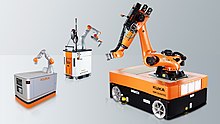Construction robots are a subset of industrial robots used for building and infrastructure construction at site.[1][2] Despite being traditionally slow to adopt new technologies, 55% of construction companies in the United States, Europe, and China now say they use robots on job sites.[3] Most of the robots working on jobsites today are designed to remove strains on humans, e.g., excavating and lifting heavy objects. Robots that survey and layout markers, tie rebar, and install drywall are also now on the market.

Other robots are being developed to perform tasks such as finishing the exterior, steel placement, construction of masonry wall, reinforcement concrete, etc. The main challenge to use robots in site is due to limitation in workspace.[4]
Features
editGeneral features include:[5]
- It must be able to move.
- It must be able to handle components of variable size and weight.
- It must be able to adjust with changing environment.
- It must be able to interact with its surroundings.
- It must be able to perform multiple tasks.
Capabilities
editConstruction robots have been tested to carry out the followings:
Notable construction by robots
edit- 30 storied Rail City Building at Yokohama, Japan was constructed by an automated system.[7]
- Concrete floor finish robot was used by Kajima and Tokimec companies in Japan.[citation needed]
- Obayashi Corporation in Japan has developed and used a system to lay concrete layers in dam construction.[8]
Social impact
editUse of the construction robots in the USA is rare, mainly due to opposition from labour unions. However, in Japan, these robots are taken positively. [7]
See also
editReferences
edit- ^ Parascho, Stefana (3 May 2023). "Construction Robotics: From Automation to Collaboration". Annual Review of Control, Robotics, and Autonomous Systems. 6 (1): 183–204. doi:10.1146/annurev-control-080122-090049. ISSN 2573-5144. S2CID 256781132.
- ^ S. Gonzalez DE, Garcia Estremera, Armada A service robot for construction industry Proceedings World Automation Congress (2004), pp. 441-446
- ^ Thibault, Matthew (7 June 2022). "Rise of the machines? For construction, not yet". Construction Dive. Retrieved 1 Feb 2023.
- ^ Gharbia, Marwan; Chang-Richards, Alice; Lu, Yuqian; Zhong, Ray Y.; Li, Heng (2020-11-01). "Robotic technologies for on-site building construction: A systematic review". Journal of Building Engineering. 32: 101584. doi:10.1016/j.jobe.2020.101584. ISSN 2352-7102. S2CID 225362095. Retrieved 2021-08-04.
- ^ Yamaguchi H, Arai T. Distributed and autonomous control method for generating shape of multiple mobile robot group. In Proceedings of IEEE/RSJ International Conference on Intelligent Robots and Systems (IROS'94) 1994 Sep 12 (Vol. 2, pp. 800-807). IEEE.
- ^ a b "Construction robotics is changing the industry in these 5 ways". The Robot Report. 2019-10-18. Retrieved 2021-08-04.
- ^ a b c Construction Robots: The Search for New Building Technology in Japan
- ^ "Dam built by robots? Japan's Obayashi tests it out". Nikkei Asia. Retrieved 2021-07-30.